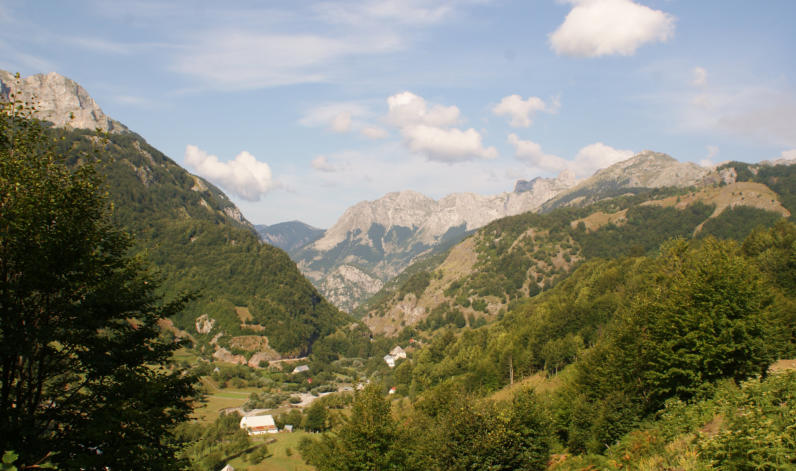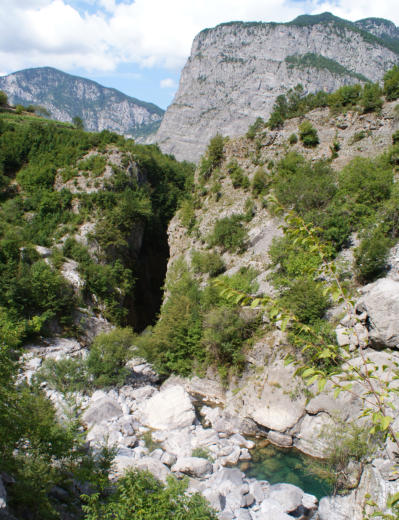
1638
Frang Bardhi:
The Pasha of Bosnia attacks Kelmendi
Frang Bardhi (1606-1643) known in Italian as Francesco Bianchi, was an early Albanian church figure and author of note. He was born in Kallmet in the northern Albanian Zadrima region and studied theology in Italy. In 1636, he was appointed as Bishop of Sapa and Sarda. In June of 1638, Bardhi sent a report on his pastoral visit in the mountains to the Sacred Congregation of the Propaganda Fide in Rome. Included in it is the following, somewhat glorified text about the northern Albanian Kelmendi tribe under attack from the Pasha of Bosnia. It must be noted that, while Bardhi sees the attack as the work of the Muslim Turks against the Catholic Kelmendi, it was the Christian merchants, repeatedly robbed by the marauding Kelmendi, who requested that the Porte take action. Most of the Pasha’s troops were Christians themselves. Report on the arrival of the Pasha of Bosnia in Albania with 15,000 men to destroy and annihilate the people of Kelmendi, in this year of our Lord 1638, at the beginning of the month of February. A village in Kelmendi (photo: Ismail Gagica, August 2011). The people of Kelmendi live in the high mountains, in fortified positions between Bosnia and Albania. They are of Albanian ethnicity, speak Albanian and live within the borders of Albania. They profess our holy Roman Catholic faith but, for a lack of priests, they are very coarse in matters of the faith. They consist of about 250 houses and 2,900 souls. They are extremely ferocious and courageous in military matters. They look haughty and are physically large. As such, when the Sultan subjugated all of Albania, Bosnia and Serbia, which are the provinces around Kelmendi tribal territory, he was not able to subject the Kelmendi tribe and some of the other tribes in the mountains of Dukagjin to his will and force them into submission, as we have noted earlier, even though he often sent many soldiers against them. The Kelmendi tribe is very rich because they are constantly out marauding for booty in Albania, Bosnia and Serbia, and attack the merchants of these three provinces, stealing from them every year about 40 to 50 horses laden with wool, butter, honey, wax, rice, fish, iron and other merchandise. They also kill the merchants who try to resist them. Things have gotten so bad recently, that they have closed the trade route and more than once have the Kelmendi entered Bosnia in broad daylight and taken slaves, animals, silverware and other household goods. This situation caused certain people from these three provinces, in particular from Bosnia, to journey to Constantinople and complain at the feet of the Sultan about such mistreatment by the Kelmendi. They said: “If nothing is done to destroy the rebel Kelmendi who are mistreating us, who are your subjects, who pay much tribute and who provide you with many services, we will no longer put up with such oppression and will flee to a Christian country with all of our families and villages, indeed the whole region, and will leave the country empty. Therefore please consider your interests well” (these words were overheard by reliable people). From such words and complaints, the Sultan grew angry with the people of Kelmendi and decided to attack them. He gave orders that a letter be sent to the Pasha of Bosnia to gather his forces as quickly as possible, as many men as he could muster, and to move on Albania without delay and destroy the Kelmendi, pardoning neither sex, and putting everything to fire and sword. With the order, he sent a rope and a turban. The rope was to remind him that if he did not destroy the Kelmendi, it would be used to hang him. The turban was purple cloth, a symbol of victory and the glory of victory. When the pasha received the order and reward from his lord, he set out to execute it. He gathered 15,000 men, continental Dalmatians, Croats, Serbs, Bulgarians and mostly Bosnians. All of them were large bearded men, but were unskilled in the art of warfare. The pasha set off for Albania with them and raised his tents on a plain near the lake of the town of Shkodra where he rested for three days. On the fourth day, he entered the town of Shkodra dressed as a Slavic peasant, without anyone noticing him. There he spent three days incognito inspecting the town and market to see if all the craftsmen and merchants were doing their jobs righteously and using proper scales. He came upon a baker who was not baking commissary bread, that the Turks call somun, of the proper weight and there, on the spot, he gave orders that the man be executed. As such, it was discovered that he was the pasha because no one but the pasha and his high-ranking officials had the right to execute delinquents without putting them on trial first. He summoned the sanjak beys of Shkodra and Dukagjin and ordered them to muster about a thousand Albanians, both Muslims and Christians, to join his 15,000 Slavs, or Harvats [Croats] as the Albanians commonly called them. It is said that the pasha had nine sanjak beys and two other lower-ranking pashas with him. One was called Halil Pasha and the other Nahum Pasha. The Pasha of Bosnia himself, who was higher-ranking and commander of all the army, was called Vučo Pasha. Once he had arranged his forces, he chose a time, prepared himself, and set off to attack the Kelmendi. He arrived at a high mountain from where he could see the Kelmendi deep down in the valley and drove his army down into Kelmendi, retaining only 2,000 men up on the mountainside with him because he was too afraid to enter Kelmendi himself. When the army reached the villages of Kelmendi in early February of this year, the men of Kelmendi hastened forth to seal the road on which the enemy had entered. They blocked it with boulders and huge tree trunks so that the enemy could not get away without a massacre, because there are only two roads that enter Kelmendi. Both are very narrow and steep to use. As the army was blocked in, it could do not damage to the villages of Kelmendi other than to set fire to some of the houses and was only able to steal a few animals because the families, the womenfolk with their possessions and animals, had all taken refuge in caves and other safe places in the mountains. The armed men sat waiting for the army to return along the aforementioned road. The Kelmendi men did them no harm other than to shout at them from time to time, telling the soldiers that they may have entered the valley joyfully and festively, but this had been a mistake, that they had not considered the damage they had done to themselves, and asking them how they intended to get out again. Considering their situation, the soldiers realised that they had been deceived by their many leaders. Soon thereafter, luck was on the side of Kelmendi because it began to snow and it snowed so much on the road and in the mountains where the soldiers had to pass that it was three paces high, and they were unable to advance in any direction. They had only taken eight days of provisions with them and when the eight days were over, they were forced to spend another eight days there and had only meat to live on, but no salt. As such, the soldiers were so terrified that no one believed he would escape alive, but that they would die of cold and hunger now that the road was blocked. In short, they were in such a sorry state that they decided either to flee or to die in some other way, not of hunger and cold. When the men of Kelmendi heard about their enemy’s decision, they reinforced the aforementioned road to lay in ambush for the enemy and fight them, i.e. to overcome them or to perish. The moment the army advanced through a narrow section of the road, the Kelmendi were so impetuous that it is said that they killed two thousand Croats on the first attack and took possession of their weapons, their cloths, horses and endless amounts of other things. As such, many of the sanjak beys fled dressed as peasants. When Vučo Pasha heard that his army had been defeated and destroyed and that their equipment had been stolen he was so distraught that he lost his mind and made ready to flee, but the Sanjak Bey of Dukagjin held him back, telling him to wait until the remaining men gathered, otherwise the infidels, i.e. the Kelmendi, would be in among them, and claiming that the disastrous news would soon be forgotten. So he waited and joined the remaining army, and returned to Shkodra. There he remained from Ash Wednesday to Maundy Thursday and then departed for Bosnia. While he was in Shkodra, he did great damage to all the poor Christians since he forced them to feed and accommodate all of the soldiers at that time. My diocese alone suffered from him and from the Sanjak Bey of Dukagjin, with a loss amounting to three thousand scudi [Italian coins]. This does not include the endless suffering of the poor Christians of the diocese of Shkodra. It is enough to note that they were forced out of their homes in the middle of winter, naked and with nothing, and had to give everything they owned to the pasha’s soldiers. This Vučo Pasha did not maintain law and order and, in fact, he was drunk most of the time. It is said that he is the son of a Schismatic [Orthodox] priest from Osijek, a place in Bosnia. [Extracts from the report of Frang Bardhi [Francesco Bianchi], Relatione della venuta del Bassà di Bosna in Albania con 15 m. homini per destruger, e disfare i Populi di Clementi, ò Chelmendi nel corrente anno del Sig.re 1638 al principio del mese di febraro. Archives of the Propaganda Fide, Visite e Collegi 17, p. 153- 162. Relation II/30. Reprinted in: Peter Bartl (ed.), Albania Sacra, 3 (Wiesbaden 2014), p. 137-140; and in Injac Zamputti (ed.), Dokumente për historinë e Shqipërisë (1623-1653) (Sankt Gallen & Prishtina 2015), p. 193-198. Translated from the Italian by Robert Elsie.]




A mountain gorge in Kelmendi
(photo: Ismail Gagica, August 2011).

| Robert Elsie | AL Art | AL History | AL Language | AL Literature | AL Photography | Contact |
